Constitutional Law | Assignment
VerifiedAdded on 2022/09/13
|11
|3078
|9
AI Summary
Contribute Materials
Your contribution can guide someone’s learning journey. Share your
documents today.
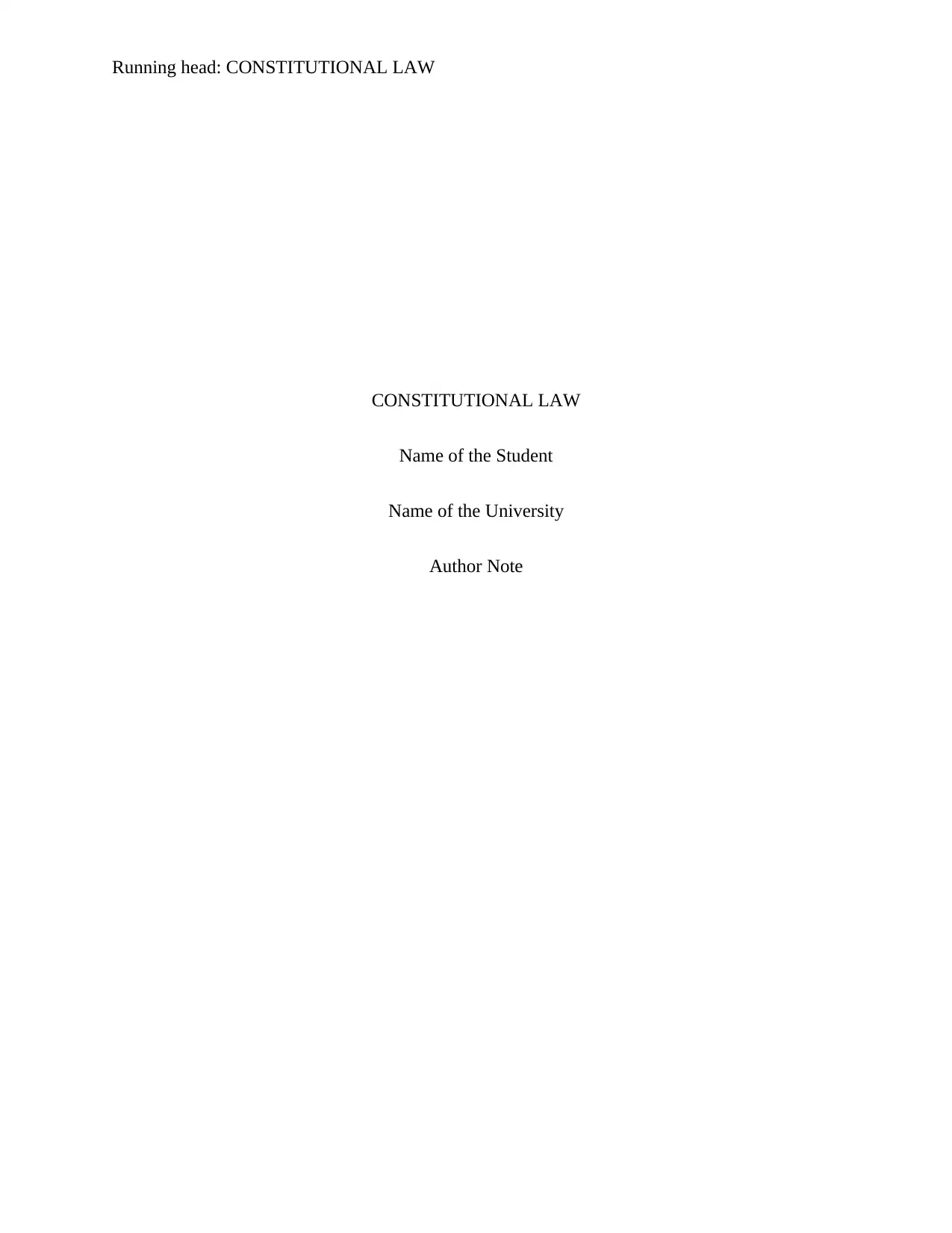
Running head: CONSTITUTIONAL LAW
CONSTITUTIONAL LAW
Name of the Student
Name of the University
Author Note
CONSTITUTIONAL LAW
Name of the Student
Name of the University
Author Note
Secure Best Marks with AI Grader
Need help grading? Try our AI Grader for instant feedback on your assignments.
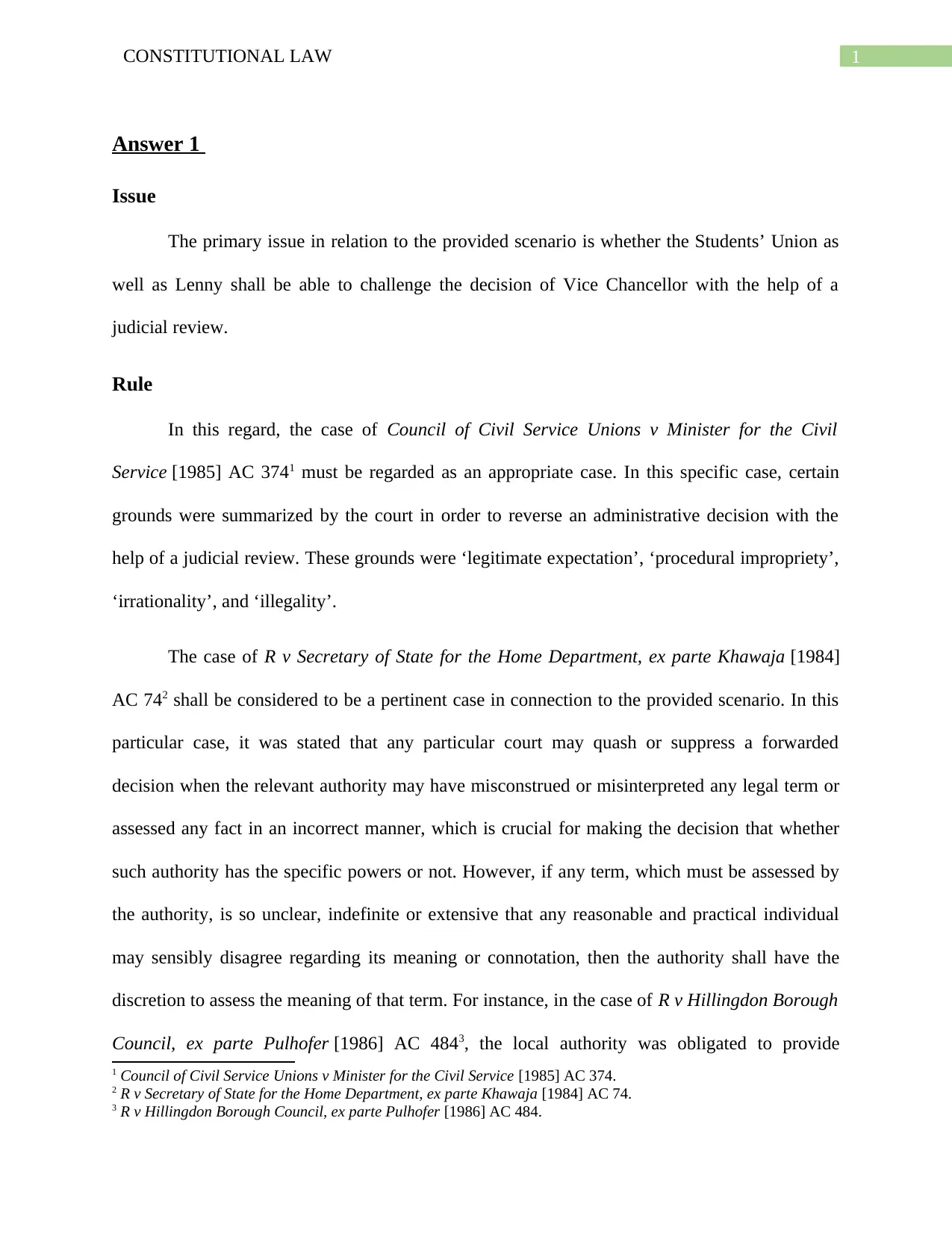
1CONSTITUTIONAL LAW
Answer 1
Issue
The primary issue in relation to the provided scenario is whether the Students’ Union as
well as Lenny shall be able to challenge the decision of Vice Chancellor with the help of a
judicial review.
Rule
In this regard, the case of Council of Civil Service Unions v Minister for the Civil
Service [1985] AC 3741 must be regarded as an appropriate case. In this specific case, certain
grounds were summarized by the court in order to reverse an administrative decision with the
help of a judicial review. These grounds were ‘legitimate expectation’, ‘procedural impropriety’,
‘irrationality’, and ‘illegality’.
The case of R v Secretary of State for the Home Department, ex parte Khawaja [1984]
AC 742 shall be considered to be a pertinent case in connection to the provided scenario. In this
particular case, it was stated that any particular court may quash or suppress a forwarded
decision when the relevant authority may have misconstrued or misinterpreted any legal term or
assessed any fact in an incorrect manner, which is crucial for making the decision that whether
such authority has the specific powers or not. However, if any term, which must be assessed by
the authority, is so unclear, indefinite or extensive that any reasonable and practical individual
may sensibly disagree regarding its meaning or connotation, then the authority shall have the
discretion to assess the meaning of that term. For instance, in the case of R v Hillingdon Borough
Council, ex parte Pulhofer [1986] AC 4843, the local authority was obligated to provide
1 Council of Civil Service Unions v Minister for the Civil Service [1985] AC 374.
2 R v Secretary of State for the Home Department, ex parte Khawaja [1984] AC 74.
3 R v Hillingdon Borough Council, ex parte Pulhofer [1986] AC 484.
Answer 1
Issue
The primary issue in relation to the provided scenario is whether the Students’ Union as
well as Lenny shall be able to challenge the decision of Vice Chancellor with the help of a
judicial review.
Rule
In this regard, the case of Council of Civil Service Unions v Minister for the Civil
Service [1985] AC 3741 must be regarded as an appropriate case. In this specific case, certain
grounds were summarized by the court in order to reverse an administrative decision with the
help of a judicial review. These grounds were ‘legitimate expectation’, ‘procedural impropriety’,
‘irrationality’, and ‘illegality’.
The case of R v Secretary of State for the Home Department, ex parte Khawaja [1984]
AC 742 shall be considered to be a pertinent case in connection to the provided scenario. In this
particular case, it was stated that any particular court may quash or suppress a forwarded
decision when the relevant authority may have misconstrued or misinterpreted any legal term or
assessed any fact in an incorrect manner, which is crucial for making the decision that whether
such authority has the specific powers or not. However, if any term, which must be assessed by
the authority, is so unclear, indefinite or extensive that any reasonable and practical individual
may sensibly disagree regarding its meaning or connotation, then the authority shall have the
discretion to assess the meaning of that term. For instance, in the case of R v Hillingdon Borough
Council, ex parte Pulhofer [1986] AC 4843, the local authority was obligated to provide
1 Council of Civil Service Unions v Minister for the Civil Service [1985] AC 374.
2 R v Secretary of State for the Home Department, ex parte Khawaja [1984] AC 74.
3 R v Hillingdon Borough Council, ex parte Pulhofer [1986] AC 484.
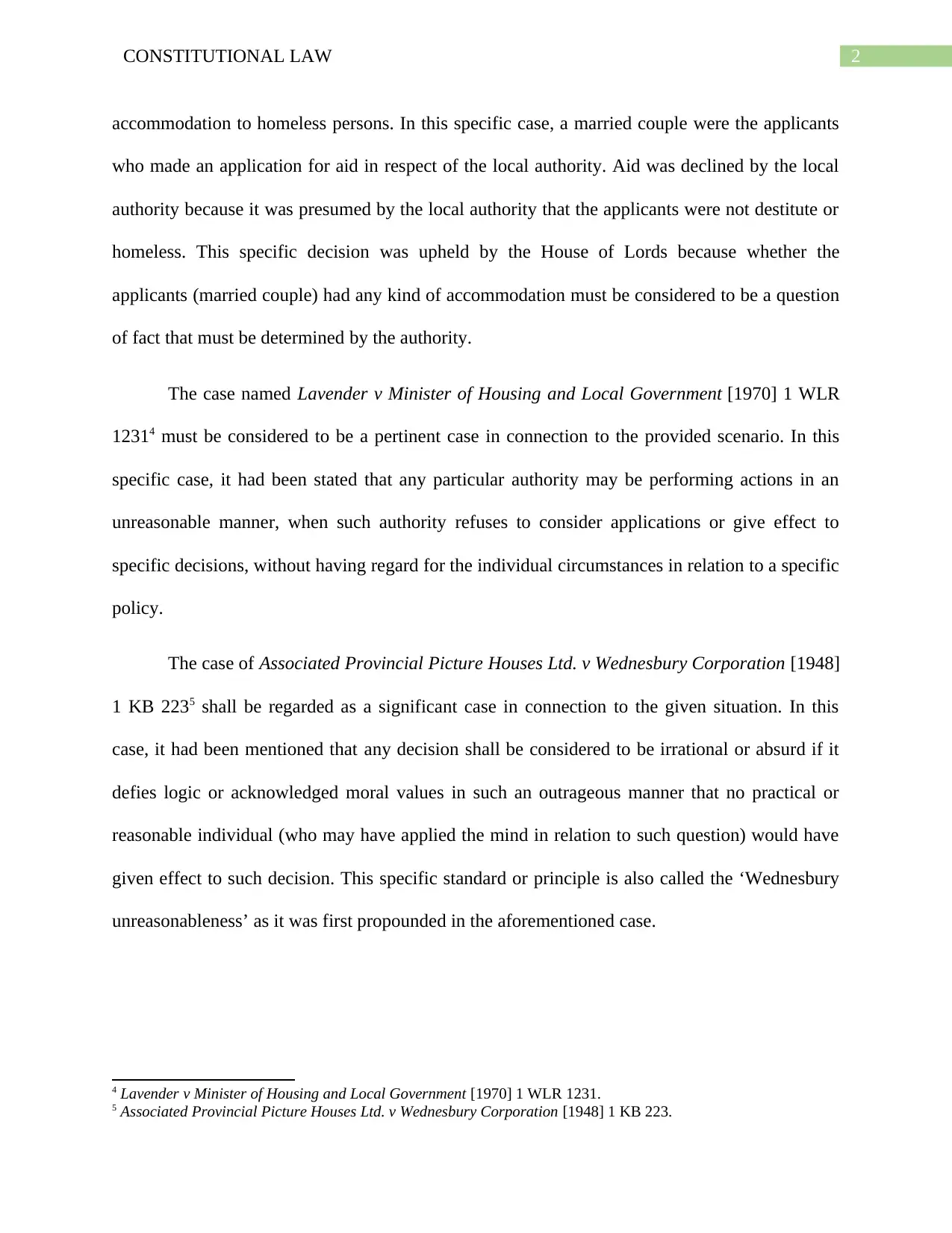
2CONSTITUTIONAL LAW
accommodation to homeless persons. In this specific case, a married couple were the applicants
who made an application for aid in respect of the local authority. Aid was declined by the local
authority because it was presumed by the local authority that the applicants were not destitute or
homeless. This specific decision was upheld by the House of Lords because whether the
applicants (married couple) had any kind of accommodation must be considered to be a question
of fact that must be determined by the authority.
The case named Lavender v Minister of Housing and Local Government [1970] 1 WLR
12314 must be considered to be a pertinent case in connection to the provided scenario. In this
specific case, it had been stated that any particular authority may be performing actions in an
unreasonable manner, when such authority refuses to consider applications or give effect to
specific decisions, without having regard for the individual circumstances in relation to a specific
policy.
The case of Associated Provincial Picture Houses Ltd. v Wednesbury Corporation [1948]
1 KB 2235 shall be regarded as a significant case in connection to the given situation. In this
case, it had been mentioned that any decision shall be considered to be irrational or absurd if it
defies logic or acknowledged moral values in such an outrageous manner that no practical or
reasonable individual (who may have applied the mind in relation to such question) would have
given effect to such decision. This specific standard or principle is also called the ‘Wednesbury
unreasonableness’ as it was first propounded in the aforementioned case.
4 Lavender v Minister of Housing and Local Government [1970] 1 WLR 1231.
5 Associated Provincial Picture Houses Ltd. v Wednesbury Corporation [1948] 1 KB 223.
accommodation to homeless persons. In this specific case, a married couple were the applicants
who made an application for aid in respect of the local authority. Aid was declined by the local
authority because it was presumed by the local authority that the applicants were not destitute or
homeless. This specific decision was upheld by the House of Lords because whether the
applicants (married couple) had any kind of accommodation must be considered to be a question
of fact that must be determined by the authority.
The case named Lavender v Minister of Housing and Local Government [1970] 1 WLR
12314 must be considered to be a pertinent case in connection to the provided scenario. In this
specific case, it had been stated that any particular authority may be performing actions in an
unreasonable manner, when such authority refuses to consider applications or give effect to
specific decisions, without having regard for the individual circumstances in relation to a specific
policy.
The case of Associated Provincial Picture Houses Ltd. v Wednesbury Corporation [1948]
1 KB 2235 shall be regarded as a significant case in connection to the given situation. In this
case, it had been mentioned that any decision shall be considered to be irrational or absurd if it
defies logic or acknowledged moral values in such an outrageous manner that no practical or
reasonable individual (who may have applied the mind in relation to such question) would have
given effect to such decision. This specific standard or principle is also called the ‘Wednesbury
unreasonableness’ as it was first propounded in the aforementioned case.
4 Lavender v Minister of Housing and Local Government [1970] 1 WLR 1231.
5 Associated Provincial Picture Houses Ltd. v Wednesbury Corporation [1948] 1 KB 223.
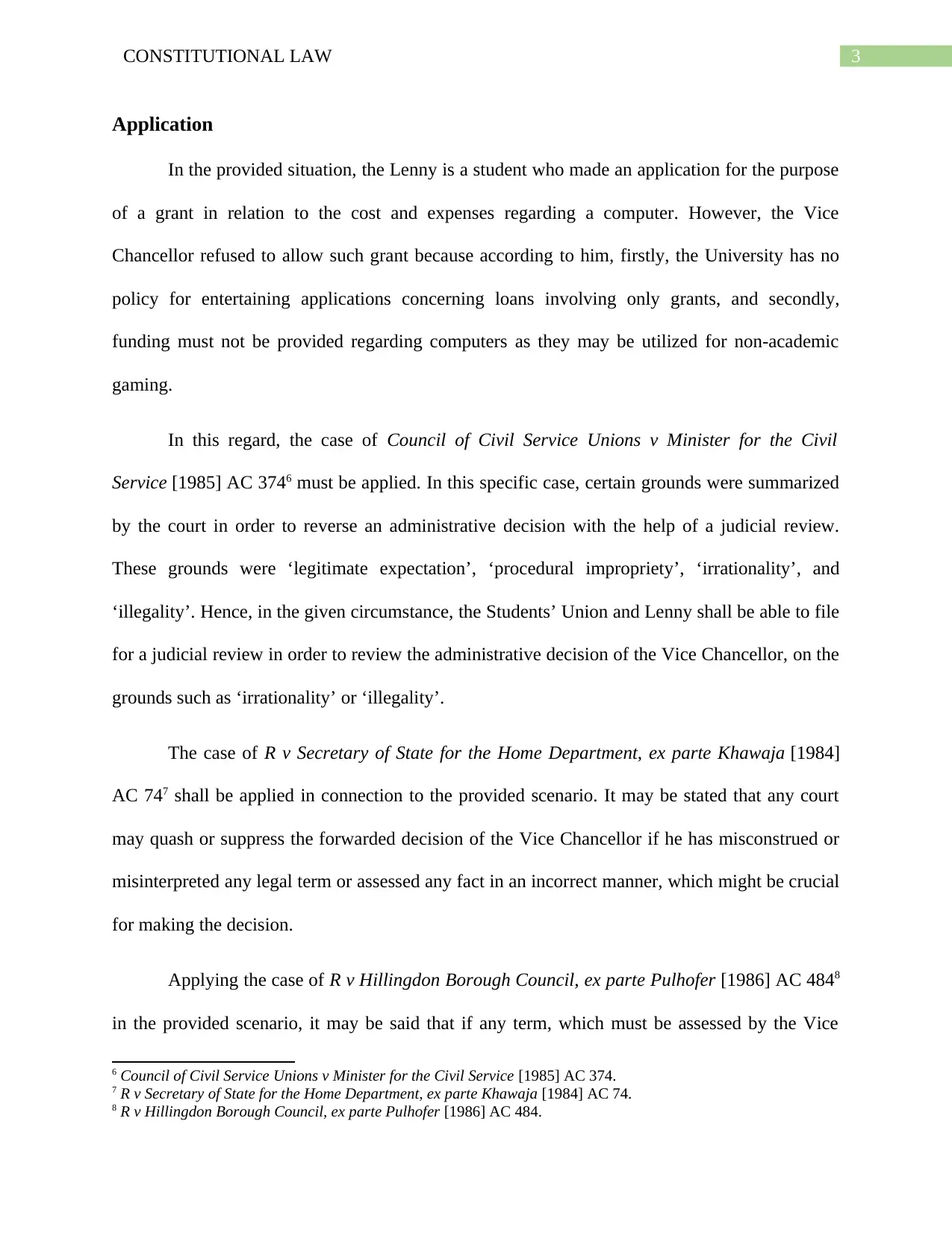
3CONSTITUTIONAL LAW
Application
In the provided situation, the Lenny is a student who made an application for the purpose
of a grant in relation to the cost and expenses regarding a computer. However, the Vice
Chancellor refused to allow such grant because according to him, firstly, the University has no
policy for entertaining applications concerning loans involving only grants, and secondly,
funding must not be provided regarding computers as they may be utilized for non-academic
gaming.
In this regard, the case of Council of Civil Service Unions v Minister for the Civil
Service [1985] AC 3746 must be applied. In this specific case, certain grounds were summarized
by the court in order to reverse an administrative decision with the help of a judicial review.
These grounds were ‘legitimate expectation’, ‘procedural impropriety’, ‘irrationality’, and
‘illegality’. Hence, in the given circumstance, the Students’ Union and Lenny shall be able to file
for a judicial review in order to review the administrative decision of the Vice Chancellor, on the
grounds such as ‘irrationality’ or ‘illegality’.
The case of R v Secretary of State for the Home Department, ex parte Khawaja [1984]
AC 747 shall be applied in connection to the provided scenario. It may be stated that any court
may quash or suppress the forwarded decision of the Vice Chancellor if he has misconstrued or
misinterpreted any legal term or assessed any fact in an incorrect manner, which might be crucial
for making the decision.
Applying the case of R v Hillingdon Borough Council, ex parte Pulhofer [1986] AC 4848
in the provided scenario, it may be said that if any term, which must be assessed by the Vice
6 Council of Civil Service Unions v Minister for the Civil Service [1985] AC 374.
7 R v Secretary of State for the Home Department, ex parte Khawaja [1984] AC 74.
8 R v Hillingdon Borough Council, ex parte Pulhofer [1986] AC 484.
Application
In the provided situation, the Lenny is a student who made an application for the purpose
of a grant in relation to the cost and expenses regarding a computer. However, the Vice
Chancellor refused to allow such grant because according to him, firstly, the University has no
policy for entertaining applications concerning loans involving only grants, and secondly,
funding must not be provided regarding computers as they may be utilized for non-academic
gaming.
In this regard, the case of Council of Civil Service Unions v Minister for the Civil
Service [1985] AC 3746 must be applied. In this specific case, certain grounds were summarized
by the court in order to reverse an administrative decision with the help of a judicial review.
These grounds were ‘legitimate expectation’, ‘procedural impropriety’, ‘irrationality’, and
‘illegality’. Hence, in the given circumstance, the Students’ Union and Lenny shall be able to file
for a judicial review in order to review the administrative decision of the Vice Chancellor, on the
grounds such as ‘irrationality’ or ‘illegality’.
The case of R v Secretary of State for the Home Department, ex parte Khawaja [1984]
AC 747 shall be applied in connection to the provided scenario. It may be stated that any court
may quash or suppress the forwarded decision of the Vice Chancellor if he has misconstrued or
misinterpreted any legal term or assessed any fact in an incorrect manner, which might be crucial
for making the decision.
Applying the case of R v Hillingdon Borough Council, ex parte Pulhofer [1986] AC 4848
in the provided scenario, it may be said that if any term, which must be assessed by the Vice
6 Council of Civil Service Unions v Minister for the Civil Service [1985] AC 374.
7 R v Secretary of State for the Home Department, ex parte Khawaja [1984] AC 74.
8 R v Hillingdon Borough Council, ex parte Pulhofer [1986] AC 484.
Secure Best Marks with AI Grader
Need help grading? Try our AI Grader for instant feedback on your assignments.
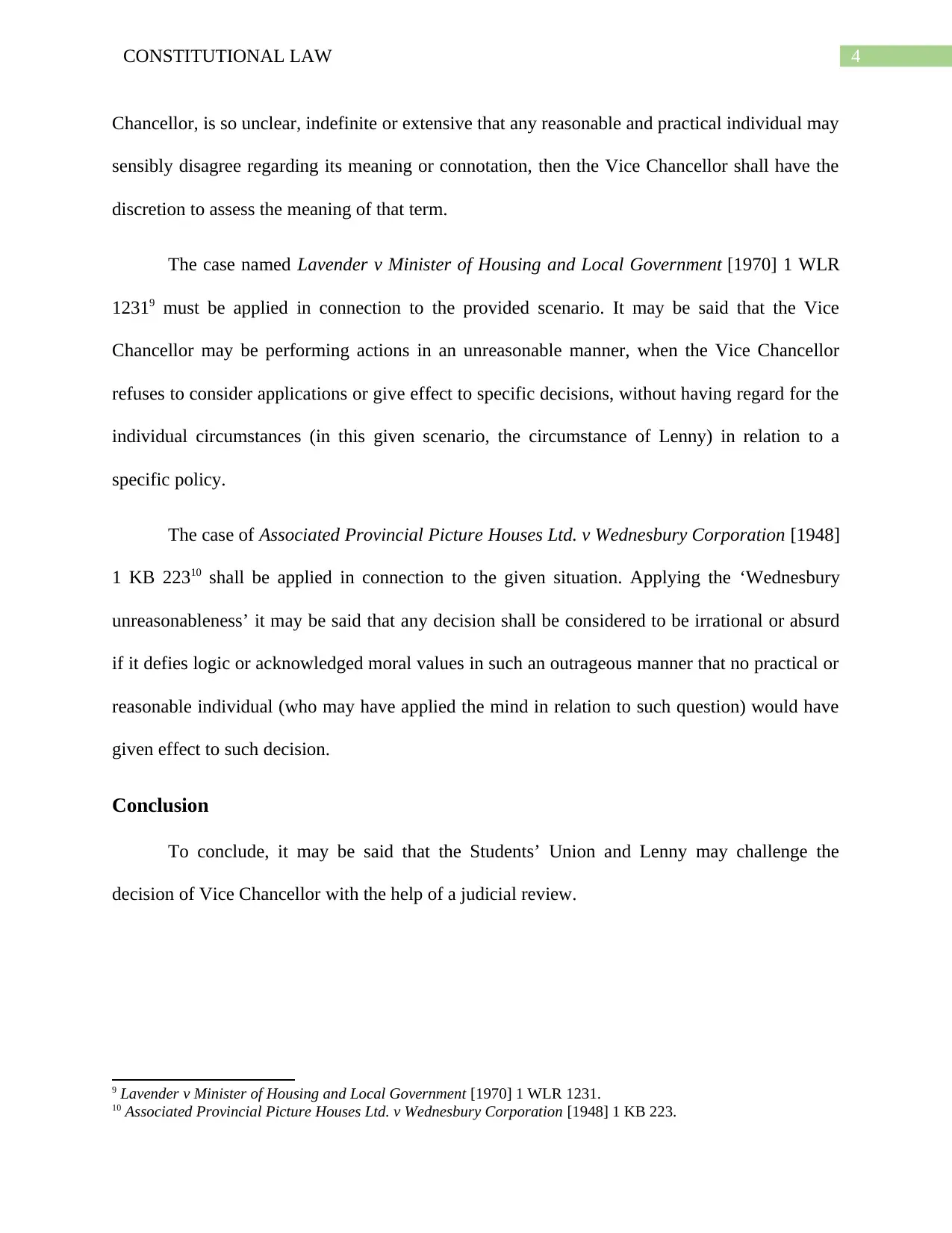
4CONSTITUTIONAL LAW
Chancellor, is so unclear, indefinite or extensive that any reasonable and practical individual may
sensibly disagree regarding its meaning or connotation, then the Vice Chancellor shall have the
discretion to assess the meaning of that term.
The case named Lavender v Minister of Housing and Local Government [1970] 1 WLR
12319 must be applied in connection to the provided scenario. It may be said that the Vice
Chancellor may be performing actions in an unreasonable manner, when the Vice Chancellor
refuses to consider applications or give effect to specific decisions, without having regard for the
individual circumstances (in this given scenario, the circumstance of Lenny) in relation to a
specific policy.
The case of Associated Provincial Picture Houses Ltd. v Wednesbury Corporation [1948]
1 KB 22310 shall be applied in connection to the given situation. Applying the ‘Wednesbury
unreasonableness’ it may be said that any decision shall be considered to be irrational or absurd
if it defies logic or acknowledged moral values in such an outrageous manner that no practical or
reasonable individual (who may have applied the mind in relation to such question) would have
given effect to such decision.
Conclusion
To conclude, it may be said that the Students’ Union and Lenny may challenge the
decision of Vice Chancellor with the help of a judicial review.
9 Lavender v Minister of Housing and Local Government [1970] 1 WLR 1231.
10 Associated Provincial Picture Houses Ltd. v Wednesbury Corporation [1948] 1 KB 223.
Chancellor, is so unclear, indefinite or extensive that any reasonable and practical individual may
sensibly disagree regarding its meaning or connotation, then the Vice Chancellor shall have the
discretion to assess the meaning of that term.
The case named Lavender v Minister of Housing and Local Government [1970] 1 WLR
12319 must be applied in connection to the provided scenario. It may be said that the Vice
Chancellor may be performing actions in an unreasonable manner, when the Vice Chancellor
refuses to consider applications or give effect to specific decisions, without having regard for the
individual circumstances (in this given scenario, the circumstance of Lenny) in relation to a
specific policy.
The case of Associated Provincial Picture Houses Ltd. v Wednesbury Corporation [1948]
1 KB 22310 shall be applied in connection to the given situation. Applying the ‘Wednesbury
unreasonableness’ it may be said that any decision shall be considered to be irrational or absurd
if it defies logic or acknowledged moral values in such an outrageous manner that no practical or
reasonable individual (who may have applied the mind in relation to such question) would have
given effect to such decision.
Conclusion
To conclude, it may be said that the Students’ Union and Lenny may challenge the
decision of Vice Chancellor with the help of a judicial review.
9 Lavender v Minister of Housing and Local Government [1970] 1 WLR 1231.
10 Associated Provincial Picture Houses Ltd. v Wednesbury Corporation [1948] 1 KB 223.
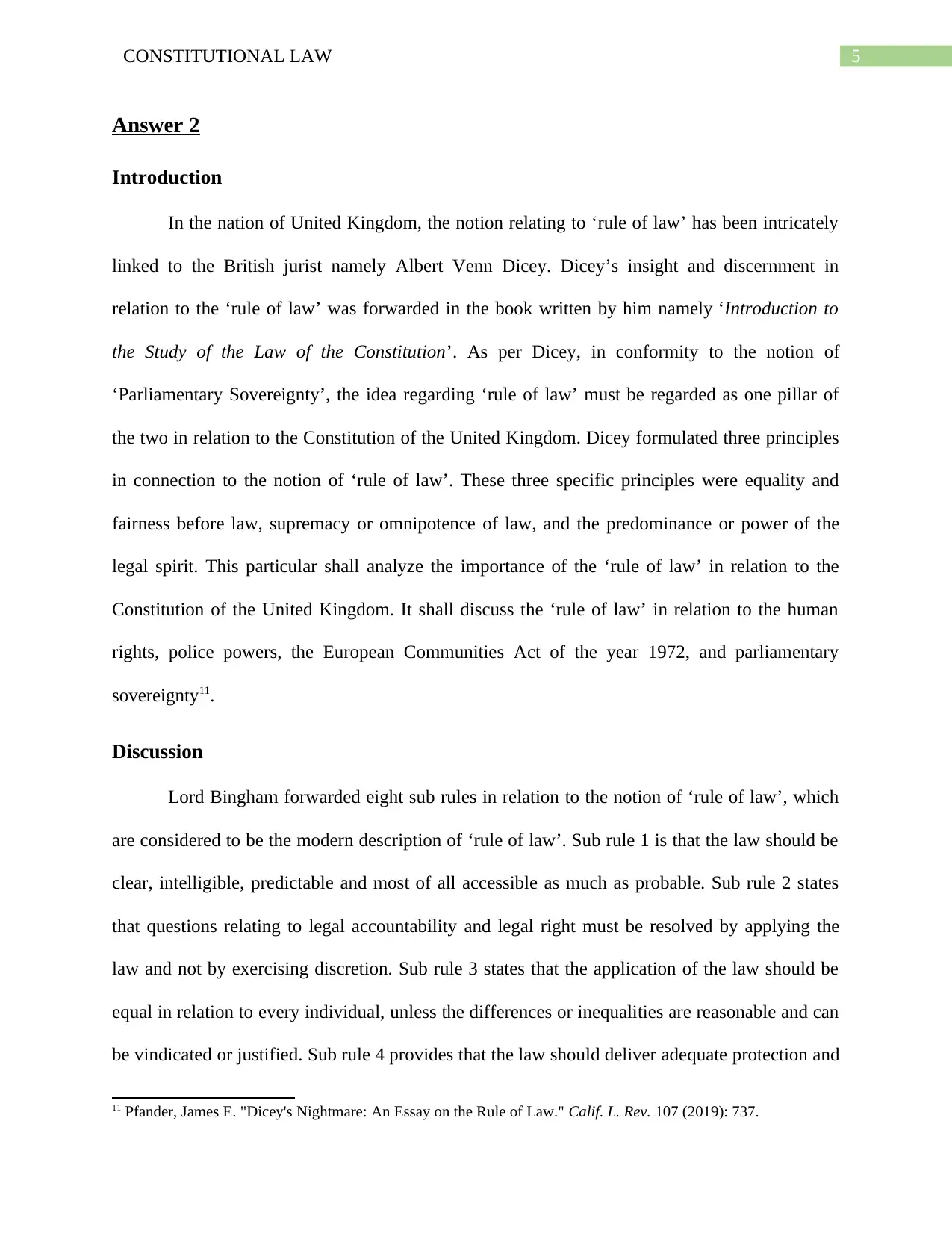
5CONSTITUTIONAL LAW
Answer 2
Introduction
In the nation of United Kingdom, the notion relating to ‘rule of law’ has been intricately
linked to the British jurist namely Albert Venn Dicey. Dicey’s insight and discernment in
relation to the ‘rule of law’ was forwarded in the book written by him namely ‘Introduction to
the Study of the Law of the Constitution’. As per Dicey, in conformity to the notion of
‘Parliamentary Sovereignty’, the idea regarding ‘rule of law’ must be regarded as one pillar of
the two in relation to the Constitution of the United Kingdom. Dicey formulated three principles
in connection to the notion of ‘rule of law’. These three specific principles were equality and
fairness before law, supremacy or omnipotence of law, and the predominance or power of the
legal spirit. This particular shall analyze the importance of the ‘rule of law’ in relation to the
Constitution of the United Kingdom. It shall discuss the ‘rule of law’ in relation to the human
rights, police powers, the European Communities Act of the year 1972, and parliamentary
sovereignty11.
Discussion
Lord Bingham forwarded eight sub rules in relation to the notion of ‘rule of law’, which
are considered to be the modern description of ‘rule of law’. Sub rule 1 is that the law should be
clear, intelligible, predictable and most of all accessible as much as probable. Sub rule 2 states
that questions relating to legal accountability and legal right must be resolved by applying the
law and not by exercising discretion. Sub rule 3 states that the application of the law should be
equal in relation to every individual, unless the differences or inequalities are reasonable and can
be vindicated or justified. Sub rule 4 provides that the law should deliver adequate protection and
11 Pfander, James E. "Dicey's Nightmare: An Essay on the Rule of Law." Calif. L. Rev. 107 (2019): 737.
Answer 2
Introduction
In the nation of United Kingdom, the notion relating to ‘rule of law’ has been intricately
linked to the British jurist namely Albert Venn Dicey. Dicey’s insight and discernment in
relation to the ‘rule of law’ was forwarded in the book written by him namely ‘Introduction to
the Study of the Law of the Constitution’. As per Dicey, in conformity to the notion of
‘Parliamentary Sovereignty’, the idea regarding ‘rule of law’ must be regarded as one pillar of
the two in relation to the Constitution of the United Kingdom. Dicey formulated three principles
in connection to the notion of ‘rule of law’. These three specific principles were equality and
fairness before law, supremacy or omnipotence of law, and the predominance or power of the
legal spirit. This particular shall analyze the importance of the ‘rule of law’ in relation to the
Constitution of the United Kingdom. It shall discuss the ‘rule of law’ in relation to the human
rights, police powers, the European Communities Act of the year 1972, and parliamentary
sovereignty11.
Discussion
Lord Bingham forwarded eight sub rules in relation to the notion of ‘rule of law’, which
are considered to be the modern description of ‘rule of law’. Sub rule 1 is that the law should be
clear, intelligible, predictable and most of all accessible as much as probable. Sub rule 2 states
that questions relating to legal accountability and legal right must be resolved by applying the
law and not by exercising discretion. Sub rule 3 states that the application of the law should be
equal in relation to every individual, unless the differences or inequalities are reasonable and can
be vindicated or justified. Sub rule 4 provides that the law should deliver adequate protection and
11 Pfander, James E. "Dicey's Nightmare: An Essay on the Rule of Law." Calif. L. Rev. 107 (2019): 737.
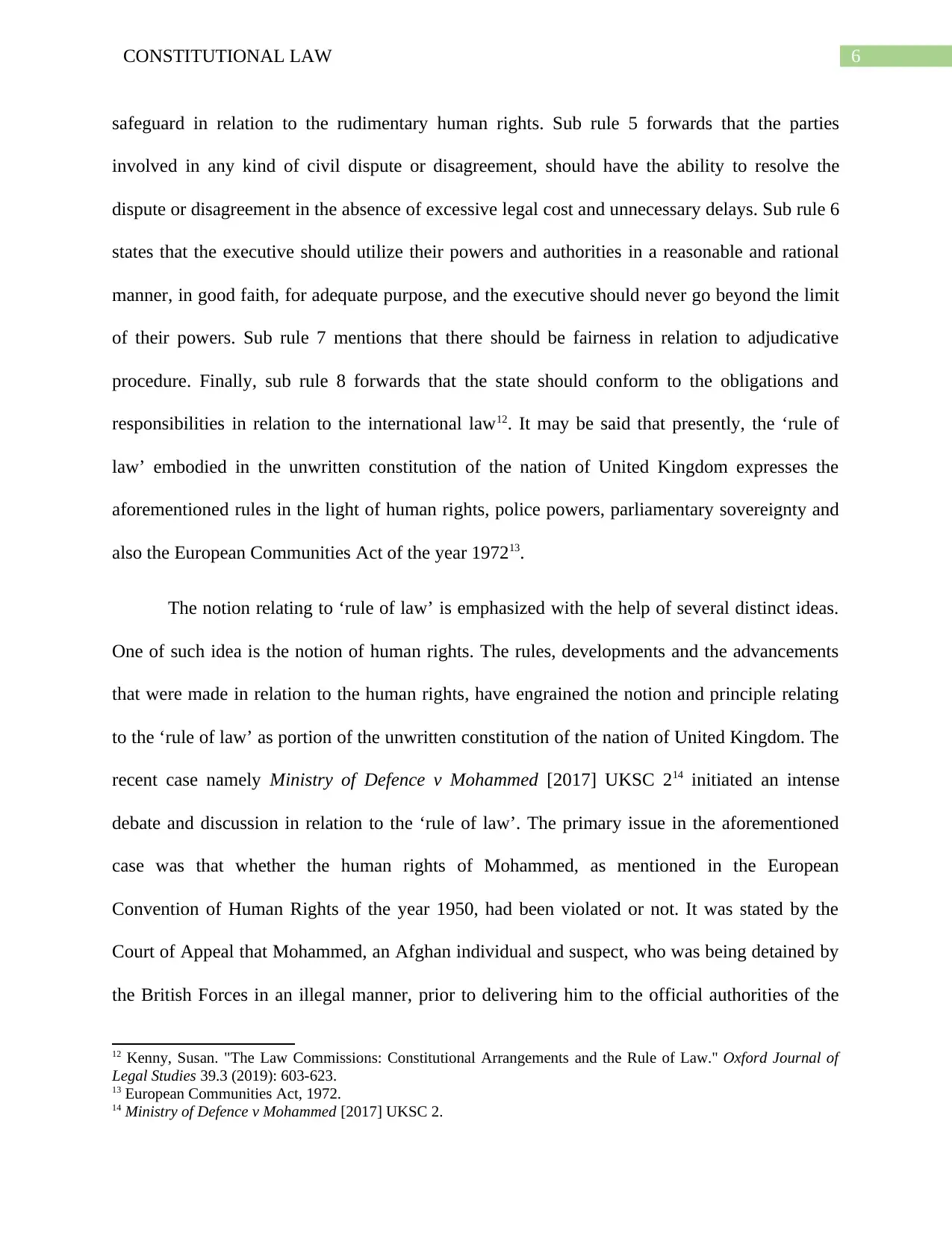
6CONSTITUTIONAL LAW
safeguard in relation to the rudimentary human rights. Sub rule 5 forwards that the parties
involved in any kind of civil dispute or disagreement, should have the ability to resolve the
dispute or disagreement in the absence of excessive legal cost and unnecessary delays. Sub rule 6
states that the executive should utilize their powers and authorities in a reasonable and rational
manner, in good faith, for adequate purpose, and the executive should never go beyond the limit
of their powers. Sub rule 7 mentions that there should be fairness in relation to adjudicative
procedure. Finally, sub rule 8 forwards that the state should conform to the obligations and
responsibilities in relation to the international law12. It may be said that presently, the ‘rule of
law’ embodied in the unwritten constitution of the nation of United Kingdom expresses the
aforementioned rules in the light of human rights, police powers, parliamentary sovereignty and
also the European Communities Act of the year 197213.
The notion relating to ‘rule of law’ is emphasized with the help of several distinct ideas.
One of such idea is the notion of human rights. The rules, developments and the advancements
that were made in relation to the human rights, have engrained the notion and principle relating
to the ‘rule of law’ as portion of the unwritten constitution of the nation of United Kingdom. The
recent case namely Ministry of Defence v Mohammed [2017] UKSC 214 initiated an intense
debate and discussion in relation to the ‘rule of law’. The primary issue in the aforementioned
case was that whether the human rights of Mohammed, as mentioned in the European
Convention of Human Rights of the year 1950, had been violated or not. It was stated by the
Court of Appeal that Mohammed, an Afghan individual and suspect, who was being detained by
the British Forces in an illegal manner, prior to delivering him to the official authorities of the
12 Kenny, Susan. "The Law Commissions: Constitutional Arrangements and the Rule of Law." Oxford Journal of
Legal Studies 39.3 (2019): 603-623.
13 European Communities Act, 1972.
14 Ministry of Defence v Mohammed [2017] UKSC 2.
safeguard in relation to the rudimentary human rights. Sub rule 5 forwards that the parties
involved in any kind of civil dispute or disagreement, should have the ability to resolve the
dispute or disagreement in the absence of excessive legal cost and unnecessary delays. Sub rule 6
states that the executive should utilize their powers and authorities in a reasonable and rational
manner, in good faith, for adequate purpose, and the executive should never go beyond the limit
of their powers. Sub rule 7 mentions that there should be fairness in relation to adjudicative
procedure. Finally, sub rule 8 forwards that the state should conform to the obligations and
responsibilities in relation to the international law12. It may be said that presently, the ‘rule of
law’ embodied in the unwritten constitution of the nation of United Kingdom expresses the
aforementioned rules in the light of human rights, police powers, parliamentary sovereignty and
also the European Communities Act of the year 197213.
The notion relating to ‘rule of law’ is emphasized with the help of several distinct ideas.
One of such idea is the notion of human rights. The rules, developments and the advancements
that were made in relation to the human rights, have engrained the notion and principle relating
to the ‘rule of law’ as portion of the unwritten constitution of the nation of United Kingdom. The
recent case namely Ministry of Defence v Mohammed [2017] UKSC 214 initiated an intense
debate and discussion in relation to the ‘rule of law’. The primary issue in the aforementioned
case was that whether the human rights of Mohammed, as mentioned in the European
Convention of Human Rights of the year 1950, had been violated or not. It was stated by the
Court of Appeal that Mohammed, an Afghan individual and suspect, who was being detained by
the British Forces in an illegal manner, prior to delivering him to the official authorities of the
12 Kenny, Susan. "The Law Commissions: Constitutional Arrangements and the Rule of Law." Oxford Journal of
Legal Studies 39.3 (2019): 603-623.
13 European Communities Act, 1972.
14 Ministry of Defence v Mohammed [2017] UKSC 2.
Paraphrase This Document
Need a fresh take? Get an instant paraphrase of this document with our AI Paraphraser
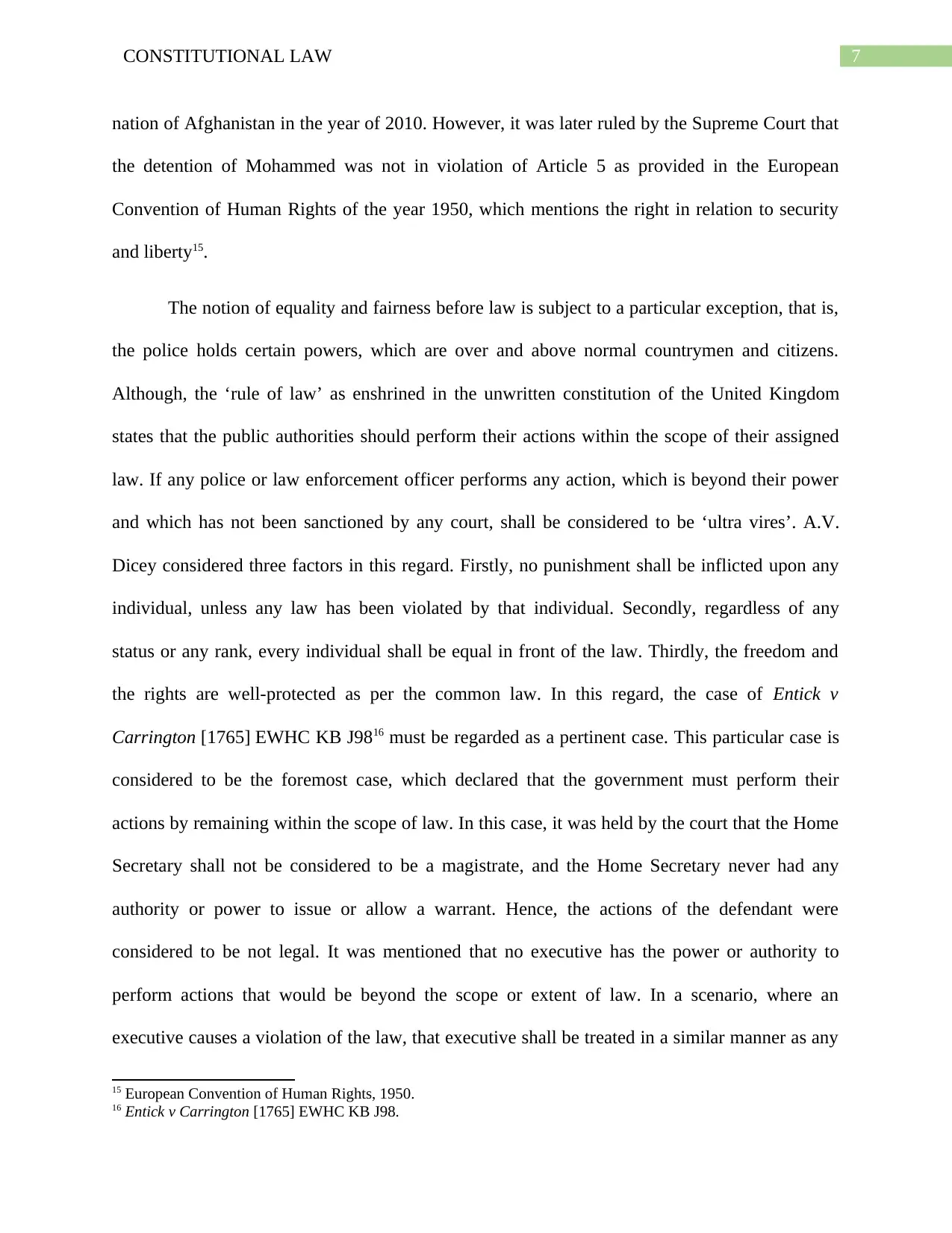
7CONSTITUTIONAL LAW
nation of Afghanistan in the year of 2010. However, it was later ruled by the Supreme Court that
the detention of Mohammed was not in violation of Article 5 as provided in the European
Convention of Human Rights of the year 1950, which mentions the right in relation to security
and liberty15.
The notion of equality and fairness before law is subject to a particular exception, that is,
the police holds certain powers, which are over and above normal countrymen and citizens.
Although, the ‘rule of law’ as enshrined in the unwritten constitution of the United Kingdom
states that the public authorities should perform their actions within the scope of their assigned
law. If any police or law enforcement officer performs any action, which is beyond their power
and which has not been sanctioned by any court, shall be considered to be ‘ultra vires’. A.V.
Dicey considered three factors in this regard. Firstly, no punishment shall be inflicted upon any
individual, unless any law has been violated by that individual. Secondly, regardless of any
status or any rank, every individual shall be equal in front of the law. Thirdly, the freedom and
the rights are well-protected as per the common law. In this regard, the case of Entick v
Carrington [1765] EWHC KB J9816 must be regarded as a pertinent case. This particular case is
considered to be the foremost case, which declared that the government must perform their
actions by remaining within the scope of law. In this case, it was held by the court that the Home
Secretary shall not be considered to be a magistrate, and the Home Secretary never had any
authority or power to issue or allow a warrant. Hence, the actions of the defendant were
considered to be not legal. It was mentioned that no executive has the power or authority to
perform actions that would be beyond the scope or extent of law. In a scenario, where an
executive causes a violation of the law, that executive shall be treated in a similar manner as any
15 European Convention of Human Rights, 1950.
16 Entick v Carrington [1765] EWHC KB J98.
nation of Afghanistan in the year of 2010. However, it was later ruled by the Supreme Court that
the detention of Mohammed was not in violation of Article 5 as provided in the European
Convention of Human Rights of the year 1950, which mentions the right in relation to security
and liberty15.
The notion of equality and fairness before law is subject to a particular exception, that is,
the police holds certain powers, which are over and above normal countrymen and citizens.
Although, the ‘rule of law’ as enshrined in the unwritten constitution of the United Kingdom
states that the public authorities should perform their actions within the scope of their assigned
law. If any police or law enforcement officer performs any action, which is beyond their power
and which has not been sanctioned by any court, shall be considered to be ‘ultra vires’. A.V.
Dicey considered three factors in this regard. Firstly, no punishment shall be inflicted upon any
individual, unless any law has been violated by that individual. Secondly, regardless of any
status or any rank, every individual shall be equal in front of the law. Thirdly, the freedom and
the rights are well-protected as per the common law. In this regard, the case of Entick v
Carrington [1765] EWHC KB J9816 must be regarded as a pertinent case. This particular case is
considered to be the foremost case, which declared that the government must perform their
actions by remaining within the scope of law. In this case, it was held by the court that the Home
Secretary shall not be considered to be a magistrate, and the Home Secretary never had any
authority or power to issue or allow a warrant. Hence, the actions of the defendant were
considered to be not legal. It was mentioned that no executive has the power or authority to
perform actions that would be beyond the scope or extent of law. In a scenario, where an
executive causes a violation of the law, that executive shall be treated in a similar manner as any
15 European Convention of Human Rights, 1950.
16 Entick v Carrington [1765] EWHC KB J98.
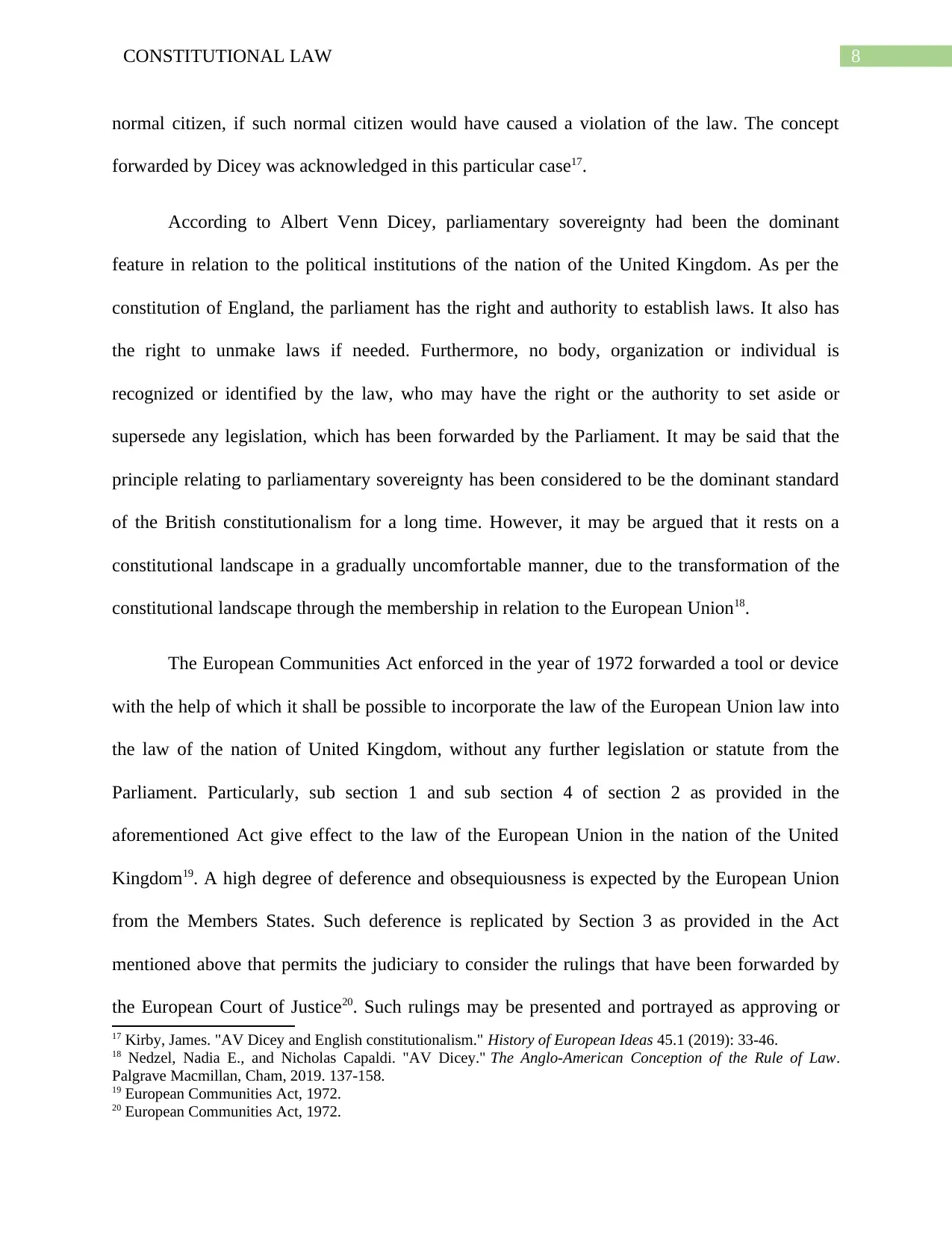
8CONSTITUTIONAL LAW
normal citizen, if such normal citizen would have caused a violation of the law. The concept
forwarded by Dicey was acknowledged in this particular case17.
According to Albert Venn Dicey, parliamentary sovereignty had been the dominant
feature in relation to the political institutions of the nation of the United Kingdom. As per the
constitution of England, the parliament has the right and authority to establish laws. It also has
the right to unmake laws if needed. Furthermore, no body, organization or individual is
recognized or identified by the law, who may have the right or the authority to set aside or
supersede any legislation, which has been forwarded by the Parliament. It may be said that the
principle relating to parliamentary sovereignty has been considered to be the dominant standard
of the British constitutionalism for a long time. However, it may be argued that it rests on a
constitutional landscape in a gradually uncomfortable manner, due to the transformation of the
constitutional landscape through the membership in relation to the European Union18.
The European Communities Act enforced in the year of 1972 forwarded a tool or device
with the help of which it shall be possible to incorporate the law of the European Union law into
the law of the nation of United Kingdom, without any further legislation or statute from the
Parliament. Particularly, sub section 1 and sub section 4 of section 2 as provided in the
aforementioned Act give effect to the law of the European Union in the nation of the United
Kingdom19. A high degree of deference and obsequiousness is expected by the European Union
from the Members States. Such deference is replicated by Section 3 as provided in the Act
mentioned above that permits the judiciary to consider the rulings that have been forwarded by
the European Court of Justice20. Such rulings may be presented and portrayed as approving or
17 Kirby, James. "AV Dicey and English constitutionalism." History of European Ideas 45.1 (2019): 33-46.
18 Nedzel, Nadia E., and Nicholas Capaldi. "AV Dicey." The Anglo-American Conception of the Rule of Law.
Palgrave Macmillan, Cham, 2019. 137-158.
19 European Communities Act, 1972.
20 European Communities Act, 1972.
normal citizen, if such normal citizen would have caused a violation of the law. The concept
forwarded by Dicey was acknowledged in this particular case17.
According to Albert Venn Dicey, parliamentary sovereignty had been the dominant
feature in relation to the political institutions of the nation of the United Kingdom. As per the
constitution of England, the parliament has the right and authority to establish laws. It also has
the right to unmake laws if needed. Furthermore, no body, organization or individual is
recognized or identified by the law, who may have the right or the authority to set aside or
supersede any legislation, which has been forwarded by the Parliament. It may be said that the
principle relating to parliamentary sovereignty has been considered to be the dominant standard
of the British constitutionalism for a long time. However, it may be argued that it rests on a
constitutional landscape in a gradually uncomfortable manner, due to the transformation of the
constitutional landscape through the membership in relation to the European Union18.
The European Communities Act enforced in the year of 1972 forwarded a tool or device
with the help of which it shall be possible to incorporate the law of the European Union law into
the law of the nation of United Kingdom, without any further legislation or statute from the
Parliament. Particularly, sub section 1 and sub section 4 of section 2 as provided in the
aforementioned Act give effect to the law of the European Union in the nation of the United
Kingdom19. A high degree of deference and obsequiousness is expected by the European Union
from the Members States. Such deference is replicated by Section 3 as provided in the Act
mentioned above that permits the judiciary to consider the rulings that have been forwarded by
the European Court of Justice20. Such rulings may be presented and portrayed as approving or
17 Kirby, James. "AV Dicey and English constitutionalism." History of European Ideas 45.1 (2019): 33-46.
18 Nedzel, Nadia E., and Nicholas Capaldi. "AV Dicey." The Anglo-American Conception of the Rule of Law.
Palgrave Macmillan, Cham, 2019. 137-158.
19 European Communities Act, 1972.
20 European Communities Act, 1972.
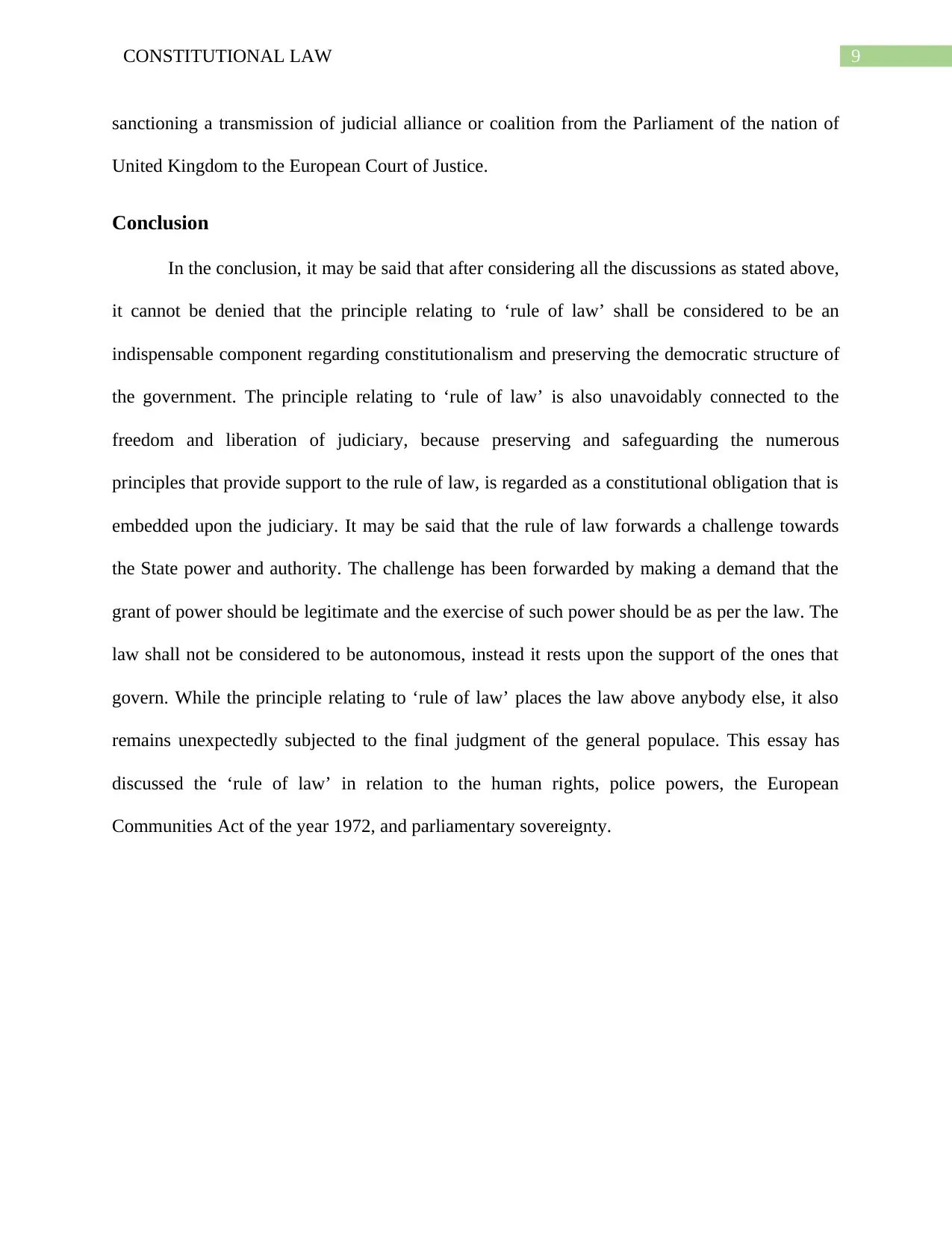
9CONSTITUTIONAL LAW
sanctioning a transmission of judicial alliance or coalition from the Parliament of the nation of
United Kingdom to the European Court of Justice.
Conclusion
In the conclusion, it may be said that after considering all the discussions as stated above,
it cannot be denied that the principle relating to ‘rule of law’ shall be considered to be an
indispensable component regarding constitutionalism and preserving the democratic structure of
the government. The principle relating to ‘rule of law’ is also unavoidably connected to the
freedom and liberation of judiciary, because preserving and safeguarding the numerous
principles that provide support to the rule of law, is regarded as a constitutional obligation that is
embedded upon the judiciary. It may be said that the rule of law forwards a challenge towards
the State power and authority. The challenge has been forwarded by making a demand that the
grant of power should be legitimate and the exercise of such power should be as per the law. The
law shall not be considered to be autonomous, instead it rests upon the support of the ones that
govern. While the principle relating to ‘rule of law’ places the law above anybody else, it also
remains unexpectedly subjected to the final judgment of the general populace. This essay has
discussed the ‘rule of law’ in relation to the human rights, police powers, the European
Communities Act of the year 1972, and parliamentary sovereignty.
sanctioning a transmission of judicial alliance or coalition from the Parliament of the nation of
United Kingdom to the European Court of Justice.
Conclusion
In the conclusion, it may be said that after considering all the discussions as stated above,
it cannot be denied that the principle relating to ‘rule of law’ shall be considered to be an
indispensable component regarding constitutionalism and preserving the democratic structure of
the government. The principle relating to ‘rule of law’ is also unavoidably connected to the
freedom and liberation of judiciary, because preserving and safeguarding the numerous
principles that provide support to the rule of law, is regarded as a constitutional obligation that is
embedded upon the judiciary. It may be said that the rule of law forwards a challenge towards
the State power and authority. The challenge has been forwarded by making a demand that the
grant of power should be legitimate and the exercise of such power should be as per the law. The
law shall not be considered to be autonomous, instead it rests upon the support of the ones that
govern. While the principle relating to ‘rule of law’ places the law above anybody else, it also
remains unexpectedly subjected to the final judgment of the general populace. This essay has
discussed the ‘rule of law’ in relation to the human rights, police powers, the European
Communities Act of the year 1972, and parliamentary sovereignty.
Secure Best Marks with AI Grader
Need help grading? Try our AI Grader for instant feedback on your assignments.
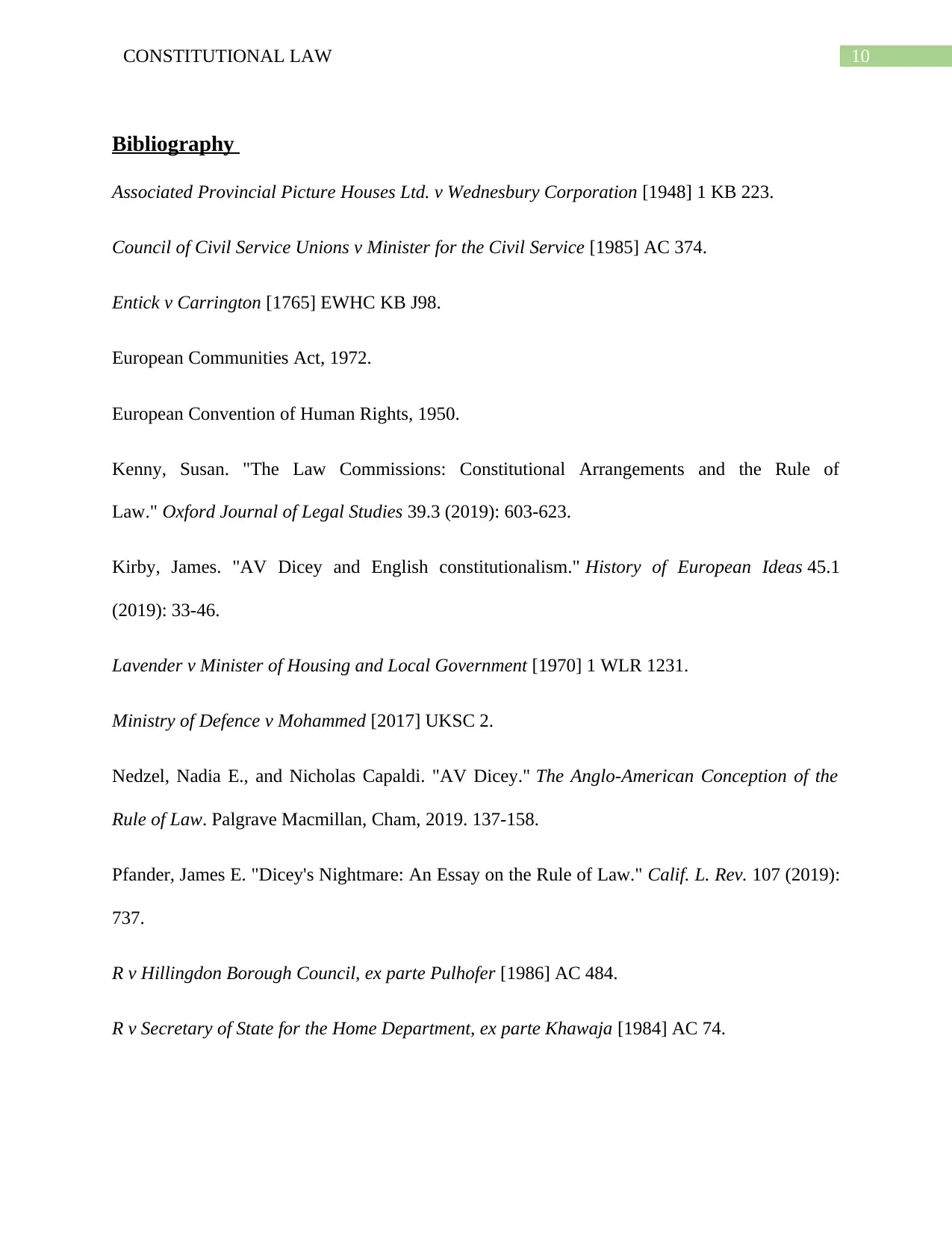
10CONSTITUTIONAL LAW
Bibliography
Associated Provincial Picture Houses Ltd. v Wednesbury Corporation [1948] 1 KB 223.
Council of Civil Service Unions v Minister for the Civil Service [1985] AC 374.
Entick v Carrington [1765] EWHC KB J98.
European Communities Act, 1972.
European Convention of Human Rights, 1950.
Kenny, Susan. "The Law Commissions: Constitutional Arrangements and the Rule of
Law." Oxford Journal of Legal Studies 39.3 (2019): 603-623.
Kirby, James. "AV Dicey and English constitutionalism." History of European Ideas 45.1
(2019): 33-46.
Lavender v Minister of Housing and Local Government [1970] 1 WLR 1231.
Ministry of Defence v Mohammed [2017] UKSC 2.
Nedzel, Nadia E., and Nicholas Capaldi. "AV Dicey." The Anglo-American Conception of the
Rule of Law. Palgrave Macmillan, Cham, 2019. 137-158.
Pfander, James E. "Dicey's Nightmare: An Essay on the Rule of Law." Calif. L. Rev. 107 (2019):
737.
R v Hillingdon Borough Council, ex parte Pulhofer [1986] AC 484.
R v Secretary of State for the Home Department, ex parte Khawaja [1984] AC 74.
Bibliography
Associated Provincial Picture Houses Ltd. v Wednesbury Corporation [1948] 1 KB 223.
Council of Civil Service Unions v Minister for the Civil Service [1985] AC 374.
Entick v Carrington [1765] EWHC KB J98.
European Communities Act, 1972.
European Convention of Human Rights, 1950.
Kenny, Susan. "The Law Commissions: Constitutional Arrangements and the Rule of
Law." Oxford Journal of Legal Studies 39.3 (2019): 603-623.
Kirby, James. "AV Dicey and English constitutionalism." History of European Ideas 45.1
(2019): 33-46.
Lavender v Minister of Housing and Local Government [1970] 1 WLR 1231.
Ministry of Defence v Mohammed [2017] UKSC 2.
Nedzel, Nadia E., and Nicholas Capaldi. "AV Dicey." The Anglo-American Conception of the
Rule of Law. Palgrave Macmillan, Cham, 2019. 137-158.
Pfander, James E. "Dicey's Nightmare: An Essay on the Rule of Law." Calif. L. Rev. 107 (2019):
737.
R v Hillingdon Borough Council, ex parte Pulhofer [1986] AC 484.
R v Secretary of State for the Home Department, ex parte Khawaja [1984] AC 74.
1 out of 11
Related Documents
Your All-in-One AI-Powered Toolkit for Academic Success.
+13062052269
info@desklib.com
Available 24*7 on WhatsApp / Email
![[object Object]](/_next/static/media/star-bottom.7253800d.svg)
Unlock your academic potential
© 2024 | Zucol Services PVT LTD | All rights reserved.





